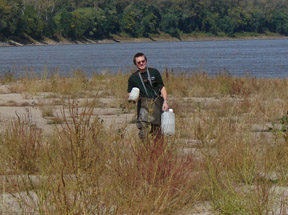Kevin W. Conway, Assistant Professor and Faculty Curator of Fishes
My research program focuses on the morphology, taxonomy and phylogenetic relationships of various groups of freshwater fishes. Most of my systematic research to date has focused on South and South East Asian groups, specifically the hyper-diverse minnows and loaches (order Cypriniformes). I am also particularly interested in the phenomenon of miniaturization (the evolution of tiny adult body sizes) in fishes and its effects on the skeletal system.
Lee A. Fitzgerald, Professor and Faculty Curator of Amphibians and Reptiles
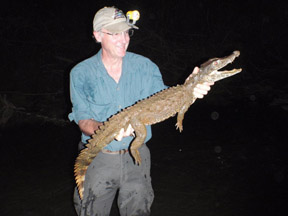 My program is best described as evolutionary ecology and conservation biology of amphibians and reptiles. I use reptiles and amphibians as study systems at the community and landscape level to address the general questions, “What are mechanisms influencing the fit between organism and environment?”, and “How do community-level processes influence species persistence and distribution of species across the landscape?” This program addresses various conservation issues, for example, habitat requirements of single species, determinants of local and regional diversity, or mechanisms determining the fate of invasive and native species.
My program is best described as evolutionary ecology and conservation biology of amphibians and reptiles. I use reptiles and amphibians as study systems at the community and landscape level to address the general questions, “What are mechanisms influencing the fit between organism and environment?”, and “How do community-level processes influence species persistence and distribution of species across the landscape?” This program addresses various conservation issues, for example, habitat requirements of single species, determinants of local and regional diversity, or mechanisms determining the fate of invasive and native species.
Toby J. Hibbitts, Curator of Amphibians and Reptiles
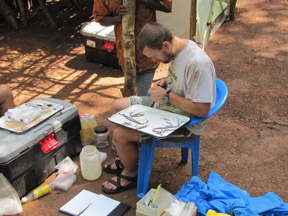 My research interests are broad and include behavioral ecology, evolutionary ecology, broader ecology, and to a lesser degree systematics and conservation of amphibians and reptiles. During my doctoral research I investigated the ecology and sexual selection in the Common Barking Gecko (Ptenopus garrulus) in South Africa. I currently am involved in several projects including specimen based ecological work on Lepidophyma gaigea, larval amphibian predator prey relationships in East Texas forest ponds, herpetofaunal surveys in Benin and the Democratic Republic of the Congo, and continued work with ecology and calling behavior in barking geckos.
My research interests are broad and include behavioral ecology, evolutionary ecology, broader ecology, and to a lesser degree systematics and conservation of amphibians and reptiles. During my doctoral research I investigated the ecology and sexual selection in the Common Barking Gecko (Ptenopus garrulus) in South Africa. I currently am involved in several projects including specimen based ecological work on Lepidophyma gaigea, larval amphibian predator prey relationships in East Texas forest ponds, herpetofaunal surveys in Benin and the Democratic Republic of the Congo, and continued work with ecology and calling behavior in barking geckos.
Jessica E. Light, Associate Professor and Faculty Curator of Mammals
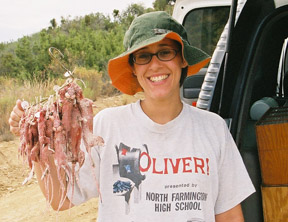 My research is focused on the evolution, systematics, and population genetics of mammals and other taxa. I am particularly interested in investigating cospeciation between mammals and their parasites to determine which factors are important in driving the associations between distantly related organisms. Please see my webpage for more information.
My research is focused on the evolution, systematics, and population genetics of mammals and other taxa. I am particularly interested in investigating cospeciation between mammals and their parasites to determine which factors are important in driving the associations between distantly related organisms. Please see my webpage for more information.
Heather L. Prestridge, Curator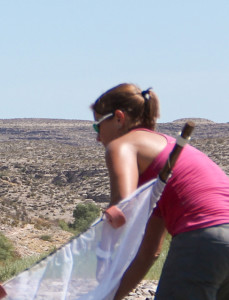
My primary roles at the BRTC is to facilitate the accessibility of our specimens and their data. I oversee student interns, volunteers and workers in improving the collections. I also assist with field collections and preparation of specimens for a variety of research projects in collaboration with the Faculty Curators and have traveled across Texas and internationally to Italy, South Africa and Trinidad in support of their projects, enhancing the resources of the collections along the way.
Gary Voelker, Professor and Faculty Curator of Birds
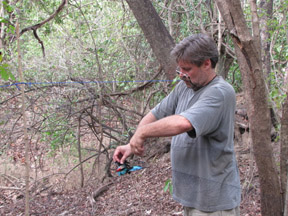 My lab focuses primarily on developing molecular phylogenies of avian lineages, and using those phylogenies to address systematic and evolutionary-based questions. The lab is currently focused on the phylogenetics and historical biogeography of Old World thrushes, chats and flycatchers, particularly those found in Africa. An emerging interest is phylogeographic and specimen-based studies of broadly distributed African bird species that occupy different habitats along their latitudinal distributions. Fieldwork to collect samples occurs annually.
My lab focuses primarily on developing molecular phylogenies of avian lineages, and using those phylogenies to address systematic and evolutionary-based questions. The lab is currently focused on the phylogenetics and historical biogeography of Old World thrushes, chats and flycatchers, particularly those found in Africa. An emerging interest is phylogeographic and specimen-based studies of broadly distributed African bird species that occupy different habitats along their latitudinal distributions. Fieldwork to collect samples occurs annually.
Mary K. Wicksten, Curator of Marine Invertebrates
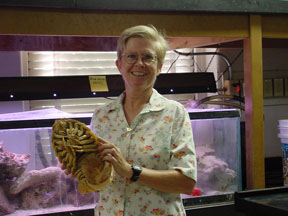 I am studying the Thoridae, a family of small-sized marine shrimp that are remarkably diverse in the cold waters of the North Pacific. Evidence from my own work and that of Greg Jensen, University of Washington, suggests that not only have species been confused (one species is actually two, three species actually are only one) but the generic designation may depend on temperature-dependent features. With a small start-up grant from the Arctic Biodiversity Study, I am collaborating with Luis Hurtado, Department of Wildlife and Fisheries Science, to obtain some molecular data on genetic affinities within the Thoridae and potentially allied shrimp taxa. These data may at least indicate which of the supposed genera are distinct or even if the Thoridae is indeed a natural group. Examination of the 150 or more presumed species will begin following an assessment of the genera.
I am studying the Thoridae, a family of small-sized marine shrimp that are remarkably diverse in the cold waters of the North Pacific. Evidence from my own work and that of Greg Jensen, University of Washington, suggests that not only have species been confused (one species is actually two, three species actually are only one) but the generic designation may depend on temperature-dependent features. With a small start-up grant from the Arctic Biodiversity Study, I am collaborating with Luis Hurtado, Department of Wildlife and Fisheries Science, to obtain some molecular data on genetic affinities within the Thoridae and potentially allied shrimp taxa. These data may at least indicate which of the supposed genera are distinct or even if the Thoridae is indeed a natural group. Examination of the 150 or more presumed species will begin following an assessment of the genera.
